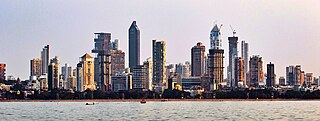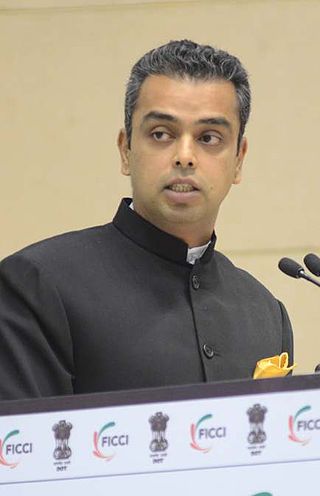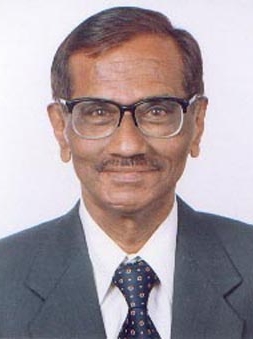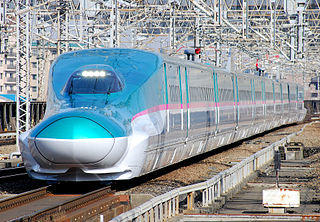
Mumbai, also known as Bombay, is the capital city of the Indian state of Maharashtra. Mumbai is the financial capital and the most populous city proper of India with an estimated population of 12.5 million (1.25 crore). Mumbai is the centre of the Mumbai Metropolitan Region, the sixth-most populous metropolitan area in the world with a population of over 23 million. Mumbai lies on the Konkan coast on the west coast of India and has a deep natural harbour. In 2008, Mumbai was named an alpha world city. Mumbai has the highest number of billionaires out of any city in Asia.

Reliance Infrastructure Limited (R-Infra), formerly Reliance Energy Limited (REL) and Bombay Suburban Electric Supply (BSES), is an Indian private sector enterprise involved in power generation, infrastructure, construction and defence. It is part of the Reliance Group. The company is headed by its chairman, Anil Ambani, and chief executive officer, Punit Narendra Garg. The corporate headquarters is in Navi Mumbai. Reliance Infrastructure's interests are in the fields of power plants, metro rail, airports, bridges, toll roads, and defence. It is a major shareholder in the other group company, Reliance Power and Reliance Naval and Engineering Limited.
The Western Freeway was a proposed controlled-access highway in Mumbai, India that would stretch from Marine Drive in South Mumbai to Kandivli in the north, a distance of 29 km. The project envisioned the construction of four major sea links over the Arabian Sea along Mumbai's western coastline to reduce traffic-congestion between the Western Suburbs and South Mumbai.

Mumbai City district is a district of Maharashtra in Konkan Division, India. As a city district, it has no headquarters or subdivisions. It, along with the Mumbai Suburban District, makes up the metropolis of Mumbai. This area is called the "Island City" or South Mumbai or Old Mumbai. It extends from Colaba in the south to Mahim and Sion in the north. The city has an area of 157 km2 (61 sq mi) and a population of 3,085,411.

Milind Murli Deora is an Indian politician who currently serves as a Member of Parliament in the Rajya Sabha from Maharashtra. He previously held key positions within the Government of India, notably as the Minister of State for Communications & Information and Technology and Shipping in the second Manmohan Singh ministry. He is currently in the Shiv Sena party which he joined after quitting the Congress party in January 2024.
Indigenous tribals have inhabited Mumbai (Bombay) since the Stone Age. The Kolis and Aagri were the earliest known settlers of the islands. Between the 2nd century BCE and 10th century CE, the islands came under the control of successive indigenous dynasties: the Satavahanas, Abhiras, Vakatakas, Kalachuris, Konkan Mauryas, Chalukyas, Rashtrakutas, Silharas & Cholas.
A municipal corporation is a type of local government in India which administeran one million. The growing population and urbanization of various Indian cities highlighted the need for a type of local governing body that could provide services such as healthcare, education, housing and transport by collecting property taxes and administering grants from the state government.
Housing in India varies from palaces of erstwhile maharajas, to modern apartment buildings in big cities, to tiny huts in far-flung villages. The Human Rights Measurement Initiative finds that India is doing 60.9% of what should be possible at its level of income for the right to housing.

The Maharashtra State Road Development Corporation Limited, commonly abbreviated as MSRDC, is an Indian public limited company fully owned by the Government of Maharashtra. MSRDC was established on 9 July 1996 and incorporated as a public limited company under the Companies Act 1956 on 2 August 1996. It is responsible for developing, building and maintaining roads in Maharashtra.

The Mumbai Trans Harbour Link, officially named as Atal Bihari Vajpayee Sewri–Nhava Sheva Atal Setu and colloquially known as Atal Setu, is a 21.8 km (13.5 mi) 6-lane grade separated expressway bridge, which connects Mumbai with Navi Mumbai, its satellite city. It is the longest sea bridge in India, and the world's 12th longest sea bridge. The bridge begins in Sewri, South Mumbai, crosses Thane Creek north of Elephanta Island, and terminates at Chirle near Nhava Sheva in Uran taluka, Navi Mumbai. The road is linked to the Mumbai–Pune Expressway in the east and to the Coastal Road in the west. The 6-lane highway is 27 meters in width, in addition to two emergency exit lanes, two edge strips, parallel crash barriers and noise barriers on both sides. The project costs a total of ₹17,843 crore (US$2.1 billion). The bridge has a capacity to handle 70,000 vehicles per day. Construction on the bridge began in April 2018, and was inaugurated by Prime Minister Narendra Modi on 12 January 2024.
Jan 28, 1940: The Samyukta Mahasabha organization is formed in Bombay to pursue the resolution passed at the literary meet.

Bal Patil was a Jain scholar, journalist, social activist and Jain minority status advocate from Mumbai, Maharashtra. He was appointed as a member of State Minority Commission by the Govt. of Maharashtra from 2001 to 2004. He was the Secretary-General of All India Jain Minority Forum, New Delhi—a position he held until his death—and was an ardent advocate of minority status for Jainism. The Jain minority cause gained prominence when he petitioned the Supreme Court of India for the recognition of Jain religious minority status on par with other Indian minorities as per the two recommendations by the National Minorities Commission. He was also the first non-medical President of the National Society for the Prevention of Heart Disease & Rehabilitation, Mumbai. He has also authored many books on Jainism and presented several papers at various seminars and conferences.

The Maharashtra Control of Organised Crime Act, 1999 is a law enacted by the state of Maharashtra in India in 1999 to combat organised crime and terrorism. Known as "MCOCA", the Act provides the State Government with special powers to tackle these issues, including powers of surveillance, relaxed evidentiary standards and procedural safeguards, and prescribing additional criminal penalties, including the death penalty. The law was introduced by a coalition government of the Bharatiya Janata Party and Shiv Sena.

Mumbai–Ahmedabad High Speed Rail Corridor (MAHSR) or Mumbai–Ahmedabad HSR is an under-construction high-speed rail line, which will connect Mumbai, the financial hub of India, with Ahmedabad, the largest city in the state of Gujarat. When completed, it will be India's first high-speed rail line, with a top speed of 320 km/h (200 mph).

The Koli is an Indian caste that is predominantly found in India, but also in Pakistan and Nepal. Koli is an agriculturist caste of Gujarat but in coastal areas they also work as fishermen along with agriculture.

The Provisions of the Panchayats Act, 1996 abbreviated as PESA Act is a law enacted by the Government of India for ensuring self governance through traditional Gram Sabhas for people living in the Scheduled Areas of India. Scheduled Areas are areas identified by the Fifth Schedule of the Constitution of India. Scheduled Areas are found in ten states of India which have predominant population of tribal communities. The Scheduled Areas, were not covered by the 73rd Constitutional Amendment or Panchayati Raj Act of the Indian Constitution as provided in the Part IX of the Constitution. PESA was enacted on 24 December 1996 to extend the provisions of Part IX of the Constitution to Scheduled Areas, with certain exceptions and modifications.
Maharashtra is a state in western India. It is the country's second-most-populous state and third-largest state by area. Maharashtra is bordered by the Arabian Sea on the west, Gujarat and the Union territory of Dadra and Nagar Haveli on the northwest, Madhya Pradesh on the north and northeast, Chhattisgarh on the east, Karnataka on the south, Telangana on the southeast and Goa on the southwest. The state covers 307,731 km2 (118,816 sq mi), or 9.84 percent of India's total area.

Coastal Road is an 8-lane, 29.2-km long grade separated expressway along Mumbai's western coastline connecting Marine Lines in the south to Kandivali in the north. It is projected to be used by 130,000 vehicles daily, and is expected to reduce travel time between South Mumbai and the Western Suburbs from 2 hours to only 40 minutes. The estimated cost of the project is ₹13,060 crore (US$1.5 billion). Its first phase, which was inaugurated on 11 March 2024, is a 10.58 km section from Princess Street flyover to the Worli end of the Bandra–Worli Sea Link.
The Versova–Bandra Sea Link (VBSL), officially Swatantrya Veer Savarkar Sea Link, is an under-construction bridge in Mumbai, Maharashtra, India as a part of Coastal Road Phase-3 or Western Coastal Road. The 17.17-kilometre (10.67 mi) bridge will connect Versova, a neighbourhood in the suburb of Andheri to the Bandra–Worli Sea Link in Bandra, as part of the Coastal Road. The 8-lane sea link is expected to reduce congestion on the Western Express Highway and the Western Line of the Mumbai Suburban Railway.
The Bombay Development Department (BDD) was established in 1920 by the British government with the primary objective of providing more land for housing and constructing 50,000 tenements on reclaimed lands. The Bombay Development Department (BDD) chawls were constructed by the British government between 1920 and 1925. It was established by Sir George Lloyd, the Governor of Bombay.











